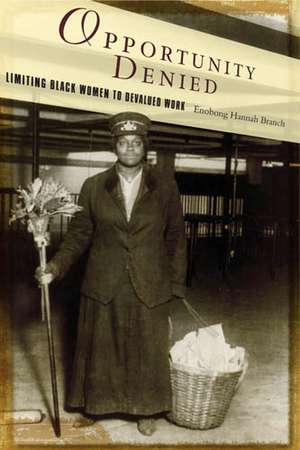Opportunity Denied: Limiting Black Women to Devalued Work
Autor Professor Enobong Branchen Limba Engleză Paperback – 8 sep 2011
Blacks and Whites. Men and Women. Historically, each group has held very different types of jobs. The divide between these jobs was stark—clean or dirty, steady or inconsistent, skilled or unskilled. In such a rigidly segregated occupational landscape, race and gender radically limited labor opportunities, relegating Black women to the least desirable jobs. Opportunity Denied is the first comprehensive look at changes in race, gender, and women’s work across time, comparing the labor force experiences of Black women to White women, Black men and White men. Enobong Hannah Branch merges empirical data with rich historical detail, offering an original overview of the evolution of Black women’s work.
From free Black women in 1860 to Black women in 2008, the experience of discrimination in seeking and keeping a job has been determinedly constant. Branch focuses on occupational segregation before 1970 and situates the findings of contemporary studies in a broad historical context, illustrating how inequality can grow and become entrenched over time through the institution of work.
From free Black women in 1860 to Black women in 2008, the experience of discrimination in seeking and keeping a job has been determinedly constant. Branch focuses on occupational segregation before 1970 and situates the findings of contemporary studies in a broad historical context, illustrating how inequality can grow and become entrenched over time through the institution of work.
| Toate formatele și edițiile | Preț | Express |
|---|---|---|
| Paperback (1) | 286.30 lei 6-8 săpt. | |
| Rutgers University Press – 8 sep 2011 | 286.30 lei 6-8 săpt. | |
| Hardback (1) | 825.88 lei 6-8 săpt. | |
| Rutgers University Press – 8 sep 2011 | 825.88 lei 6-8 săpt. |
Preț: 286.30 lei
Nou
Puncte Express: 429
Preț estimativ în valută:
54.79€ • 59.49$ • 46.02£
54.79€ • 59.49$ • 46.02£
Carte tipărită la comandă
Livrare economică 23 aprilie-07 mai
Preluare comenzi: 021 569.72.76
Specificații
ISBN-13: 9780813551234
ISBN-10: 0813551234
Pagini: 208
Ilustrații: 51 tables and graphs
Dimensiuni: 152 x 229 x 13 mm
Greutate: 0.31 kg
Ediția:None
Editura: Rutgers University Press
Colecția Rutgers University Press
ISBN-10: 0813551234
Pagini: 208
Ilustrații: 51 tables and graphs
Dimensiuni: 152 x 229 x 13 mm
Greutate: 0.31 kg
Ediția:None
Editura: Rutgers University Press
Colecția Rutgers University Press
Notă biografică
ENOBONG HANNAH BRANCH is an assistant professor of sociology at the University of Massachusetts, Amherst.
Cuprins
Introduction
1. Hierarchies of Preference at Work: The Need for an Intersectional Approach
2. As Good as Any Man: Black Women in Farm Labor
3. Excellent Servants: Domestic Service as Black Women's Work
4. Existing on the Industrial Fringe: Black Women in the Factory
5. Your Blues Ain't Nothing Like Mine: Race and Gender as Keys to Occupational Opportunity
6. The Illusion of Progress: Black Women's Work in the Post-Civil Rights Era
1. Hierarchies of Preference at Work: The Need for an Intersectional Approach
2. As Good as Any Man: Black Women in Farm Labor
3. Excellent Servants: Domestic Service as Black Women's Work
4. Existing on the Industrial Fringe: Black Women in the Factory
5. Your Blues Ain't Nothing Like Mine: Race and Gender as Keys to Occupational Opportunity
6. The Illusion of Progress: Black Women's Work in the Post-Civil Rights Era
Recenzii
"In an exemplary application of intersectional analysis to Black women’s labor history, Branch convincingly demonstrates that the 100- year legacy of racial and gender exclusion explains Black women’s poverty today."
“This is an important story to tell and Branch’s Opportunity Denied makes a significant contribution to the study of black women’s work.”
"This is a wonderful, well-written and carefully argued book. Branch does an excellent job of demonstrating how historical inequalities can take hundreds of years to remedy."
"Branch has done an excellent job analyzing a very complex and loaded topic. This book will surely required reading for scholars interested
in intersectionality and labor-market inequalities."
in intersectionality and labor-market inequalities."
"Branch’s thesis is a powerful one. What does opportunity and economic progress really mean for black women as mothers, sisters, partners, and caretakers? For Branch, and the majority of black women, it indicates an occupational structure that maintains and protects the status quo and offers little promise of change."
Descriere
Opportunity Denied is the first comprehensive look at changes in race, gender, and women’s work across time, comparing the labor force experiences of Black women to White women, Black men and White men. From free Black women in 1860 to Black women in 2008, the experience of discrimination in seeking and keeping a job has been determinedly constant. Branch focuses on occupational segregation before 1970 and situates the findings of contemporary studies in a broad historical context, illustrating how inequality can grow and become entrenched over time through the institution of work.














